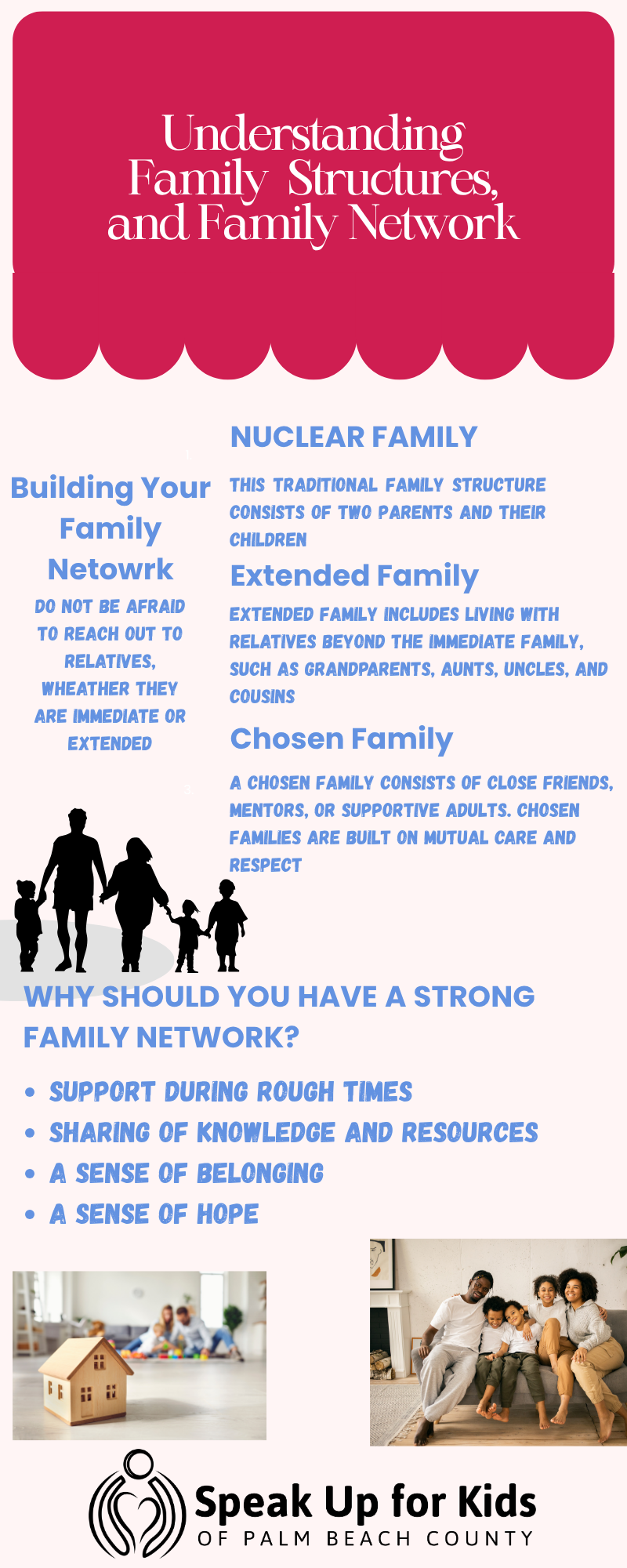Family Network
Contributed by Speak Up for Kids Student Intern Team — This article was developed through the combined efforts of multiple student interns, each bringing unique skills and perspectives to support life skills education for foster youth.
Overview
Building a family network is essential for anyone transitioning out of foster care, as it provides emotional support, guidance, and a sense of belonging. Understanding the dynamics of different family structures, such as nuclear families, extended families, and chosen families, can help you create a strong support system as you navigate life’s challenges.
Understanding Family Structures
Nuclear Family: This traditional family structure consists of two parents and their children. In some cases, foster children may become part of a nuclear family through adoption or long-term foster care placements. The stability and routine provided by a nuclear family can offer a strong foundation for growth and development.
Extended Family: Extended families include relatives beyond the immediate family, such as grandparents, aunts, uncles, and cousins. For foster youth, connecting with extended family members, if possible, can provide additional sources of support and connection. Extended families often play a crucial role in providing care and fostering a sense of identity and heritage.
Chosen Family: For many individuals who age out of foster care, creating a chosen family—comprising close friends, mentors, or supportive adults—can be just as important as biological family connections. A chosen family is built on mutual care, respect, and shared experiences, offering a strong support network when biological family ties are limited or non-existent.
Building Your Family Network
Reconnecting with Biological Family: If it’s safe and possible, reconnecting with biological family members can be a way to strengthen your family network. Consider reaching out to siblings, parents, or extended family members who may provide emotional support and a sense of continuity in your life.
Engaging with Foster Families: Even after aging out of the foster care system, maintaining relationships with former foster families can offer continued support and guidance. Foster parents who care deeply about your well-being may remain a valuable part of your life as mentors or trusted advisors.
Developing a Chosen Family: Surround yourself with people who genuinely care about you, whether they are friends, mentors, or community members. Building a chosen family can provide you with emotional support, encouragement, and a sense of belonging, which are vital for your well-being.
Utilizing Community Resources: Many communities offer support groups, mentoring programs, and other resources for individuals transitioning out of foster care. Engaging with these resources can help you connect with others who share similar experiences and build a network of support.
The Importance of a Strong Family Network
Emotional Support: A strong family network provides emotional support during challenging times, helping you navigate the ups and downs of life.
Guidance and Advice: Family members, whether biological, foster, or chosen, can offer valuable advice and guidance based on their own experiences.
Sense of Belonging: Being part of a family network fosters a sense of belonging, which is crucial for your mental and emotional well-being.
Stability: A reliable family network offers stability and consistency, which can be especially important for those who have experienced the uncertainties of the foster care system.
Final Thoughts
Building a family network, whether through reconnecting with biological relatives, maintaining ties with foster families, or creating a chosen family, is essential for your overall well-being and success. Understanding the different family structures and how they can support you will help you create a strong foundation as you move forward in life. Remember, family is not just about biology; it’s about the connections you make and the people who stand by you through thick and thin.


